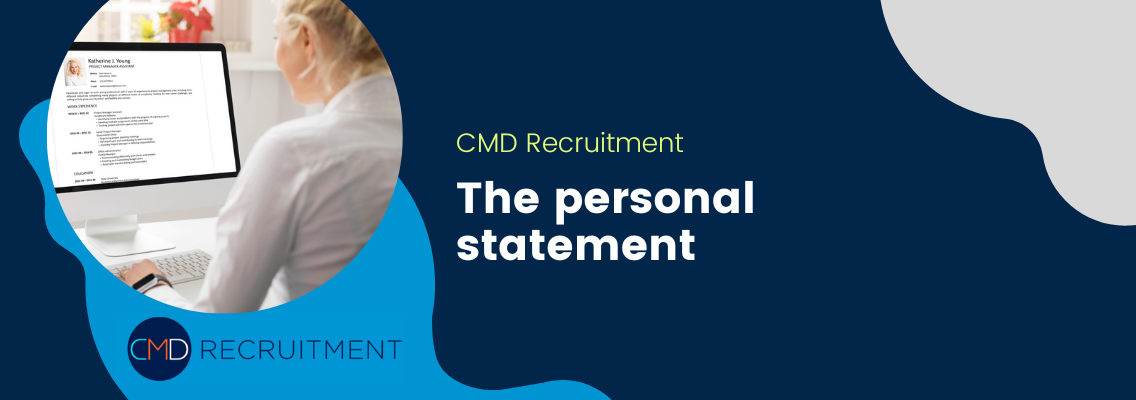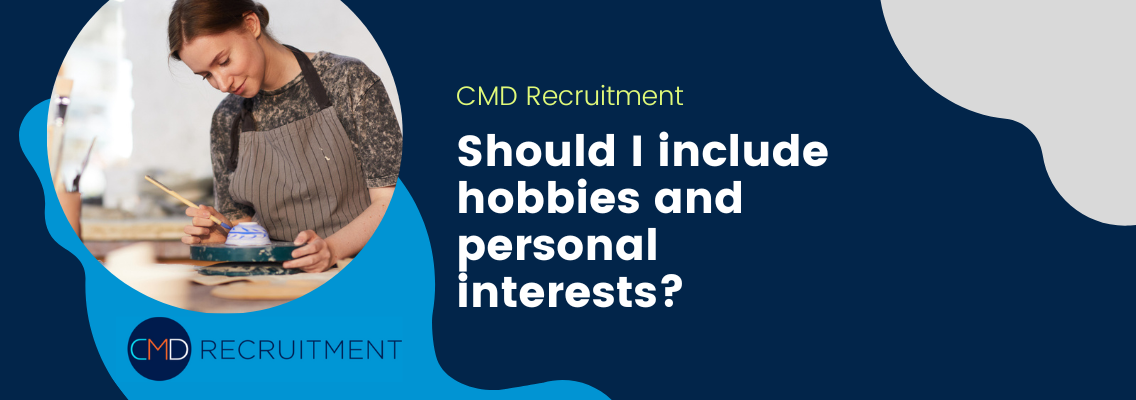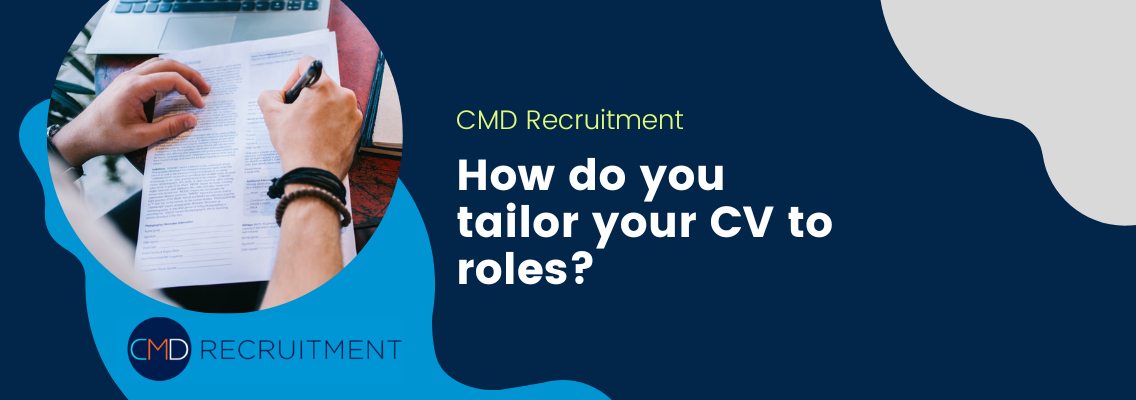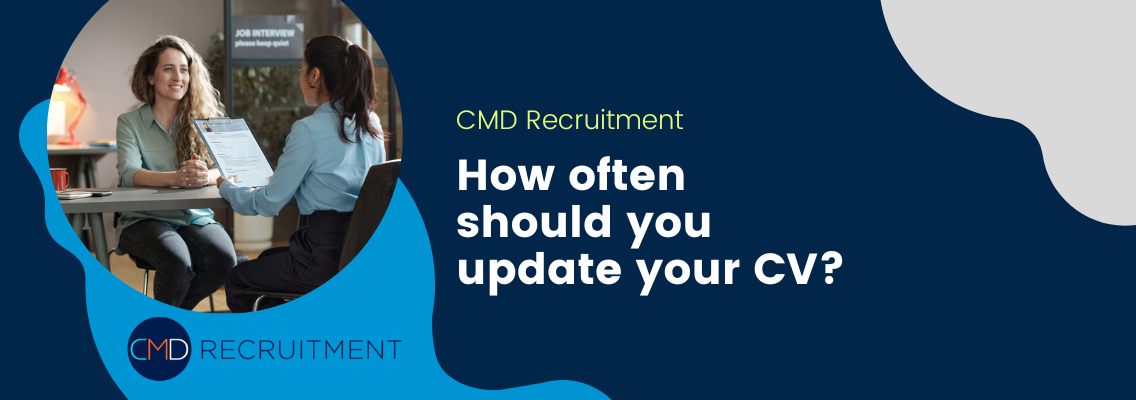Important notice - We are aware of a scam where people are impersonating CMD Recruitment to offer jobs via WhatsApp & Telegram. This is a scam, CMD Recruitment will never contact new candidates via these methods. Any legitmate offer from CMD Recruitment would be made via a telephone call.

September 4, 2023
Whether you are writing your CV for the first time or sprucing up an existing CV for a new job hunt, it can be difficult to know what to include. A well-crafted CV can help you to stand out from the crowd and make an incredible first impression. It won’t ace the interview for you, but it can help you to get a foot in the door.
In this guide, we will explore some of the most important things to include on your CV, and what to leave out. We’ll also share our top tips for ensuring that your CV makes the right first impression.
These small components are essential to ensure your CV helps you to land a job. You’d be surprised how many people forget to include their contact details on their CV or include out-of-date contact details. Unless you are specifically told otherwise, you should always include:

Another key part of the CV is your personal statement. Take your time to perfect this section of your CV, as it is essentially your elevator pitch. It should always be tailored to the role, but you can reuse sections of it that are relevant to your experience. You should include:
As you can see, the bulk of this section is dedicated to the role, so you will need to rewrite this for every job unless the job titles and profiles are largely the same in your sector.

Next up, you should list your work experience in reverse chronological order. This basically means that you put your current role first, and then work backwards. If you have an extensive work history, you may want to be selective about which jobs you include on your CV.
For every position, you should include:
Use action verbs to make your CV more impactful. You can also use shortened language to get your point across without taking up too much space. Provided the meaning is clear, you don’t have to communicate in complete sentences.
If you are going to highlight achievements, try to back these up with statistics. For example, if you want to say that you increased sales while acting as a sales manager, give a percentage or numeric value.
You should also refer back to the job description you are applying for and make sure that you have demonstrated all of the key competencies for the role in your job history. This is a simple but effective way to show that you have understood the requirements for the role.

If you are a recent graduate and you don’t have any relevant work history, you might consider putting your education history first. Otherwise, it should always be listed after your work experience.
Make sure you include:
Most people will include their GCSEs (or equivalent), their A Levels (or equivalent) and their degree on their CV. However, if you hold a higher degree, you might stop mentioning earlier education such as high school and college and focus on your university education.

By this point, you have given the interview panel a good idea about who you are, where you have studied and what you bring to the table. Now it’s time to impress them with your specific skills.
You could include things like:

While many people include a place for references on their CVs, very few people actually include the contact details of their references. It’s perfectly fine to simply state “references available on request” on your CV. Why is this?
Hiring managers rarely go straight to checking references, so they don’t need to know the details in the very early stages. Including contact details for your references is really just a waste of space.
If a hiring manager wants to hire you, checking your references is often the last step before a firm job offer is made. If you have lied and don’t have any references, they will simply need to make a decision about whether or not to move forward with your application.
If you are a recent graduate and you don’t have a lot of information to put on your CV, you might be more inclined to include references. If you do this, check that you have permission beforehand.

These optional extras are the things that not everyone needs to include, but you should if they are relevant to you and relevant to the role. This could include things like:

There is a good argument for including a short section about your hobbies and personal interests to help give the hiring manager a more rounded picture of who you are.
However, you should include these with caution and only mention things that can be linked back to the job description. For example, if you are applying for a leadership role and you are the captain of your volleyball team, this would be more relevant than simply saying you play the sport.
A lot of people don’t have enough space on their CV to include details of their hobbies and interests, and this is the only reason they leave it out. However, if you have the capacity to include this information, it could help the hiring manager to see you as a well-rounded person.
The specifics about how you format your CV are less important than the overall appearance of your CV. It should be professional and consistent, easy to read, and not overcrowded. You are trying to fit in a lot of information, so try giving yourself more space by decreasing the margins. Just be sure you don’t go beyond the printing guidelines.
Try using bullet points to make the content easy to scan and make sure there is good use of white space to prevent it from looking overwhelming.
Most people will stick to a CV of between 1-2 pages. If you need more, be wary that some employers won’t look at anything beyond the second page due to time constraints. It’s better to spend some time trimming back your CV.

You will typically have a general CV that is suitable for most job applications, or for sharing with recruiters and uploading to job sites. When you are applying for specific roles, you can make small changes to your CV that will further highlight your suitability for the role. You would typically start by updating the personal profile to meet the specifications of the role.
You could then adapt your work history to place greater emphasis on some roles more than others. You can also highlight key competencies by adapting the bullet points under your work and education history.
Once you have finished listing all relevant work and education history, return to the job specification. Tick off anything that you have mentioned and then highlight anything that is missing. You can then use the “additional” sections to make sure you mention any outstanding competencies you have missed.
Your cover letter should do most of the heavy lifting when it comes to tailoring an application to a specific role, but that’s not to say that your CV can’t be tailored in some ways.

It’s tempting to only look at your CV when you’re about to start applying for jobs, but you could do yourself a big favour by updating it more frequently. When you revisit your CV more often, you are more likely to remember to include smaller details from throughout your career. These small details – such as promotions and landmark projects – can help your CV stand out from the crowd.
Instead of waiting for the job search to start before you update your CV, try checking in every couple of months to make sure it’s still up-to-date and an accurate representation of your skills.
We hope that this guide has been useful in helping you to decide what to include in your CV and what to leave out. The most important thing to remember is that there are certain things that an employer cannot legally ask you to mention on your CV. This includes things like your age, sexual orientation and marital status. It would also be very unusual for an employer to ask you to include a photo with your CV.
Back to Blog